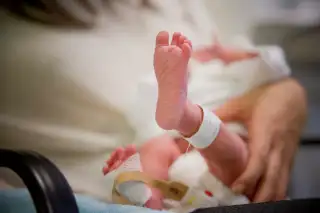The Beyond-Stupid Reason One Nurse Got Hit With a Nearly $1 Million Bill After Giving Birth

Lauren Bard, an ER nurse from California, gave birth to her daughter three months early last September.
It was a traumatic delivery — doctors said her daughter, Sadie, had only a 50% chance of surviving. But after weeks of nail biting in the emergency room and neonatal intensive care unit, both mom and baby pulled through..
Then came the bill.
On October 7, about a year after Sadie's birth, Bard posted a photo to Facebook of a statement from the University of California, Irvine Medical Center. Bard owed $898,000, it said.
Dignity Health, the company that owns the hospital Bard works for, requires employees to enroll newborns within 31 days of their birth to get coverage, according to ProPublica, which first reported this story. And while Bard says she called her plan administer three days after Sadie’s birth, she didn't call Dignity directly. So the nearly $1 million bill was now her responsibility.
Egregious labor and delivery charges have been making lots of headlines lately—from a viral Reddit post of one dad’s $40 fee for “skin to skin contact” (holding his own baby) to a $1,000 bill charged to a new mom for a 15 second “consultation” with an anesthesiologist—and they paint a shocking portrait of the state of maternity care in the U.S..
The average fee for a 24-hour hospital stay and a non-Caesarean delivery hovers around $11,000, and that number jumps to about $30,000 with before and after-care, according to data cited in the Economist. Even with insurance, parents are left with an average bill of about $3,000.
In the end, Dignity reversed its decision to block Bard's daughter from her insurance plan. Cases like these are rare, but not extraordinary — at the hospital where Bard gave birth, 1% to 2% of mother face similar situations, according to ProPublica.
Had the company not reversed course settling the debt "would take so long I'd be dead," Bard tells the publication.